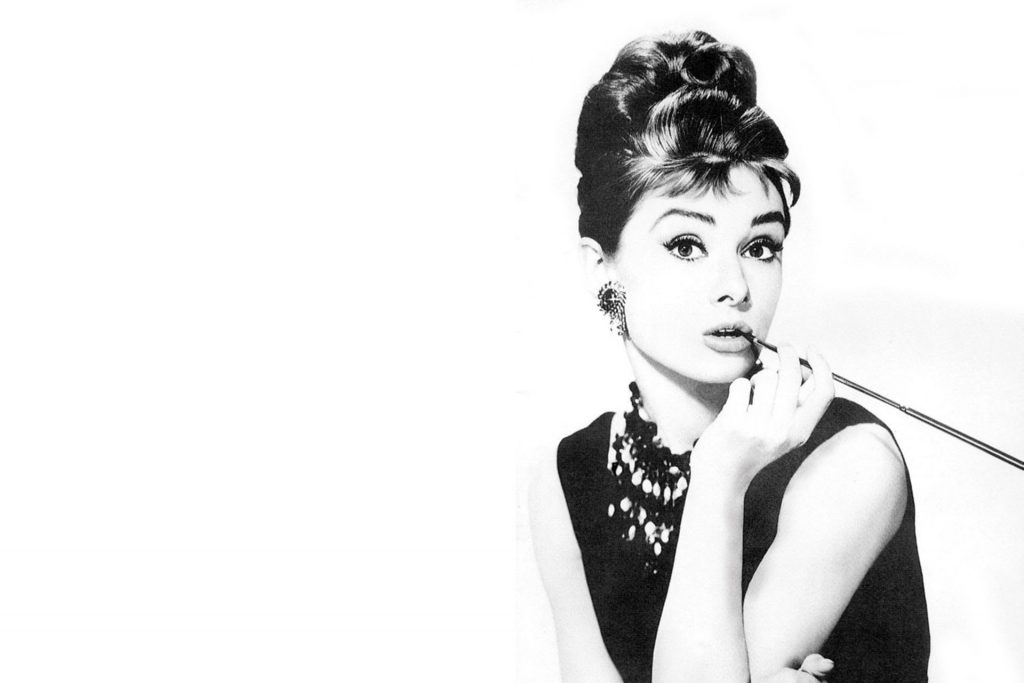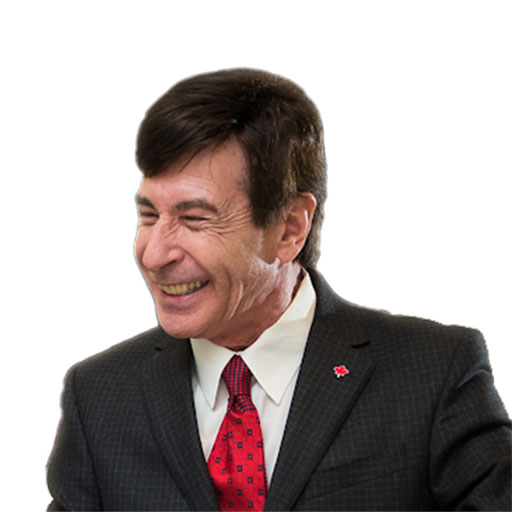My first event at the Empire Club of Canada and why it changed my life
When Empire Club Past President Tony van Straubenzee launches his new book of reminiscences later this week, you can pretty much bet your bottom dollar that it will contain some references to the year 1989, a very special time in his life that saw him welcome a President of the United States, Ronald Reagan, and arguably the most iconic Hollywood starlet of cinematic history, Audrey Hepburn, to the podium of the Empire Club of Canada. Concerning the Hepburn visit, he may recall that it was a pleasant April 27th spring day in Toronto, and needless to say, the City was abuzz as the Oscar-winning legend arrived in town to accept the invitation that had been extended to her a year earlier by the President of Canada’s premier speaking platform, a man who like herself came from Dutch heritage, and to bring a message to Canadians and to the whole world on the terrible plight of children impacted by war.
I was seated about two rows of tables back from the front for this lunch, my first at the Empire Club of Canada, and had a very hard time taking my eyes off this beautiful woman who had dazzled the world with 31 high-quality films, including classics that are all in our collective memories like Roman Holiday, My Fair Lady and of course Breakfast at Tiffany’s. Born on May 4th, 1929 to a mother who was a Dutch baroness and a father who was a very successful Anglo-Austrian businessman, she went from training as a dental assistant to being who Entertainment Weekly called the greatest movie star of all time. This was the woman that Henry Mancini wrote “Moon River” about, the person who gave women what is now simply referred to as “the little black dress”, and it was not surprising to anyone that the United Nations had asked her to be their international spokesperson for the children of the world. Her elegant speech that day, entitled simply “For the Children”, brought many to tears, because we all heard about the unbearable suffering of innocent young souls who were ravaged by war, given no chance to fulfill their destiny as human beings. Here are the last lines from her unforgettable speech that day:
“Camps and now overcrowded towns where hundreds of newcomers arrive every day after months of walking. Many die on the way, phantoms carrying their sick transparent babies, but reaching their destination, urged on by the one human quality which is the last to die, hope. Even if this mammoth operation Life-Line Sudan were only to achieve half its goal due to the countless odds it is up against in a vast country with no infrastructure, few roads to speak of and no communication system, it will have succeeded. Not only in saving thousands of lives, but together with the government, the rebels, the brave, tireless NGO’s, pilots, truck drivers, loaders and operation officers, it will have given the Sudan hope, and the United Nations will have proven that only through corridors of tranquility can children be saved, and only through peace can a man survive.
There is so much we cannot do. We cannot give the children back their parents, but we can return to them the most basic of human rights, the right to health, to tenderness, to life.”
I remember fighting back my own tears as she looked out over the audience and uttered those last words, and I also remember knowing that this was a special moment for everyone who witnessed it. What we didn’t know at the time, of course, was that she was coming to the end of her life, and that she would soon leave us. When she died of cancer less than four years later on January 20th, 1993, the day that the United States inaugurated President Bill Clinton for the first time, and the birthday of her Breakfast at Tiffany’s co-star Patricia Neal, I was terribly saddened as was the rest of the world but not particularly surprised as we all knew about her very heavy addiction to cigarettes. A few years later, I planted the new “Audrey Hepburn” tulip in my garden and watched as it grew into a beautiful showpiece of a flower, and I remembered every time I passed it in my garden that this diminutive woman had not only enchanted the world with her talent and beauty but had also made it a better place because of the compassion that she demonstrated for so many things, especially children. And if she were still around today at the age of 87, the really tragic thing to note is that she could give exactly the same speech about the miseries of war and the heart-wrenching impact that it has on our children, just replacing the word “Sudan” for “Syria” or a number of other totally-failed states in the world where children grow up with death, torture, disease and basic insanity all around them, almost ensuring that they will not have anything but misery to grow up with, almost nothing but tears to pass on to their own children.
That was the day that I fell in love with the Empire Club of Canada…April 27th, 1989. It was the day that we welcomed a legend into our midst, a legend who made a plea for a better world, for our species to stop for just a few moments and remember what is really important in our lives. It is a lesson that I will never, ever forget…that our societal leaders can use their power, their celebrity, and their fortune to try and make life on this planet just a little bit better for each and every one of us and for those we love, both here at home in Canada and in those many regions of the world that are so much less fortunate than we are.
When Empire Club Past President Tony van Straubenzee launches his new book of reminiscences later this week, you can pretty much bet your bottom dollar that it will contain some references to the year 1989, a very special time in his life that saw him welcome a President of the United States, Ronald Reagan, and arguably the most iconic Hollywood starlet of cinematic history, Audrey Hepburn, to the podium of the Empire Club of Canada. Concerning the Hepburn visit, he may recall that it was a pleasant April 27th spring day in Toronto, and needless to say, the City was abuzz as the Oscar-winning legend arrived in town to accept the invitation that had been extended to her a year earlier by the President of Canada’s premier speaking platform, a man who like herself came from Dutch heritage, and to bring a message to Canadians and to the whole world on the terrible plight of children impacted by war.
I was seated about two rows of tables back from the front for this lunch, my first at the Empire Club of Canada, and had a very hard time taking my eyes off this beautiful woman who had dazzled the world with 31 high-quality films, including classics that are all in our collective memories like Roman Holiday, My Fair Lady and of course Breakfast at Tiffany’s. Born on May 4th, 1929 to a mother who was a Dutch baroness and a father who was a very successful Anglo-Austrian businessman, she went from training as a dental assistant to being who Entertainment Weekly called the greatest movie star of all time. This was the woman that Henry Mancini wrote “Moon River” about, the person who gave women what is now simply referred to as “the little black dress”, and it was not surprising to anyone that the United Nations had asked her to be their international spokesperson for the children of the world. Her elegant speech that day, entitled simply “For the Children”, brought many to tears, because we all heard about the unbearable suffering of innocent young souls who were ravaged by war, given no chance to fulfill their destiny as human beings. Here are the last lines from her unforgettable speech that day:
“Camps and now overcrowded towns where hundreds of newcomers arrive every day after months of walking. Many die on the way, phantoms carrying their sick transparent babies, but reaching their destination, urged on by the one human quality which is the last to die, hope. Even if this mammoth operation Life-Line Sudan were only to achieve half its goal due to the countless odds it is up against in a vast country with no infrastructure, few roads to speak of and no communication system, it will have succeeded. Not only in saving thousands of lives, but together with the government, the rebels, the brave, tireless NGO’s, pilots, truck drivers, loaders, and operation officers, it will have given the Sudan hope, and the United Nations will have proven that only through corridors of tranquility can children be saved, and only through peace can a man survive.
There is so much we cannot do. We cannot give the children back their parents, but we can return to them the most basic of human rights, the right to health, to tenderness, to life.”
I remember fighting back my own tears as she looked out over the audience and uttered those last words, and I also remember knowing that this was a special moment for everyone who witnessed it. What we didn’t know at the time, of course, was that she was coming to the end of her life and that she would soon leave us. When she died of cancer less than four years later on January 20th, 1993, the day that the United States inaugurated President Bill Clinton for the first time, and the birthday of her Breakfast at Tiffany’s co-star Patricia Neal, I was terribly saddened as was the rest of the world but not particularly surprised as we all knew about her very heavy addiction to cigarettes. A few years later, I planted the new “Audrey Hepburn” tulip in my garden and watched as it grew into a beautiful showpiece of a flower, and I remembered every time I passed it in my garden that this diminutive woman had not only enchanted the world with her talent and beauty but had also made it a better place because of the compassion that she demonstrated for so many things, especially children. And if she were still around today at the age of 87, the really tragic thing to note is that she could give exactly the same speech about the miseries of war and the heart-wrenching impact that it has on our children, just replacing the word “Sudan” for “Syria” or a number of other totally-failed states in the world where children grow up with death, torture, disease and basic insanity all around them, almost ensuring that they will not have anything but misery to grow up with, almost nothing but tears to pass on to their own children.
That was the day that I fell in love with the Empire Club of Canada…April 27th, 1989. It was the day that we welcomed a legend into our midst, a legend who made a plea for a better world, for our species to stop for just a few moments and remember what is really important in our lives. It is a lesson that I will never, ever forget…that our societal leaders can use their power, their celebrity, and their fortune to try and make life on this planet just a little bit better for each and every one of us and for those we love, both here at home in Canada and in those many regions of the world that are so much less fortunate than we are.


